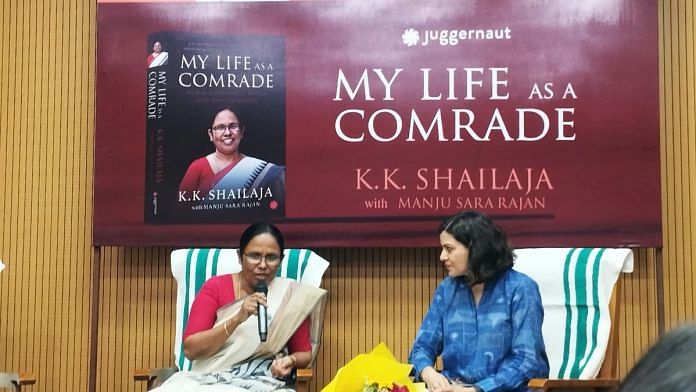New Delhi: Kerala Chief Minister Pinarayi Vijayan was at Kerala House in New Delhi on Friday, speaking to a packed audience in his signature measured tone. But the crowd hadn’t gathered for him. They were attending the launch of Kerala’s former health minister KK Shailaja’s autobiography — My Life as a Comrade.
“While it is an autobiography, that’s not all the book is limited to. It holds up a mirror to the history and the mood of the state,” the CM said while launching it.
Written with journalist Manju Sara Rajan and published by Juggernaut Books, My Life as a Comrade: The Story of an Extraordinary Politician and the World That Shaped Her dives into Shailaja’s journey as a communist.
Also present at the launch was Communist Party of India (Marxist) politburo member Brinda Karat and Justice Kurian Joseph, a retired judge of the Supreme Court.
This book isn’t about revolution, gossip and betrayal, said Chiki Sarkar, co-founder of Juggernaut Books. “It’s about a life in politics.”
Shailaja was Kerala’s health and family welfare minister from 2016 to 2021. During her tenure, she was hailed for containing the spread of the Nipah virus and the management of the Covid-19 pandemic. Her efforts were appreciated internationally, chiefly by the United Nations which took note of her work. Back home, her record-breaking landslide victory in the 2021 assembly election speaks for itself.
For the CPI(M), this book is a story of how to achieve success through collective struggle and movements.
“Comrade has not just written a chronological account of what has happened from when she was born to now,” CM Vijayan said.
“In the first part of the book, she explores what society looked like, the kinds of discrimination and the depth of oppression that existed. She elaborates the circumstances that lead to it.”
He added that by setting the scene from her great-grandfather’s time under British rule to her grandfather’s association with the Communist Party, Shailaja shows how party leaders bettered the lives of those around them.
Both Vijayan and Joseph spoke in Malayalam, much to the dismay of the who’s who of Delhi’s liberals and Leftists. As Joseph put it, “I don’t think any language other than Malayalam will suit this occasion, particularly for the type of emotions Shailaja teacher has brought out in this book.”
The event was a private conversation between the people of Kerala and the woman they lovingly call ‘Teacher’.
Also Read: Non-Dalits can go through life not knowing Ambedkar’s work, jolt needed: Author Ashok Gopal
A woman in politics
Dressed in a simple white saree with a golden border, Shailaja looked at the overflowing crowd of people with a big smile. She immediately kicked into organisation mode, instructing people in Malayalam and arranging for more seating for mediapersons, comrades and bureaucrats who had gathered for the event.
The book launch was followed by a conversation between Shailaja and journalist Nidhi Razdan.
Shailaja, speaking in English now, talked about how she got her first lesson in dealing with communicable diseases from her grandmother, MK Kalyani, who would take care of smallpox patients who had been rejected by their own families.
“She was very good at social service— even if someone in the family was ill, she would rush to help the patients,” Shailaja said. “I have grown up listening to the stories of my grandmother and the martyrs who lost their lives while working for the society.”
She also spoke about how women are judged more by society, still struggling to achieve emancipation and equality. Even after a woman is elected by the public, there is always a looming shadow of doubt over her abilities, she said.
“That’s why I was very keen to do the job well. It was not just my job. As a woman and a minister, I had to get everyone’s support, including my employees and my colleagues. Women are not secondary. If men can, women can also do this work,” Shailaja insisted.
In the book, she writes that she was conscious of the responsibility she was taking on in 2016. “Because if one of us does a bad job, people criticise our entire gender.”
Also Read: ‘Religion is faith, not politics’—S Irfan Habib’s book on Maulana Azad has lessons for today
Core part of her identity
The CPI(M) has also had a deep influence on Shailaja’s life. She built her reputation as a grassroots activist, earning the trust of the party and the people. It is clear from the title of the book that the party’s ideology forms a core part of her identity.
When Razdan asked the former government school teacher what lessons she learnt during the pandemic, she spoke about handling the propaganda.
She talked about how people thought communists did not believe in God and how Covid was seen as God’s punishment. She concluded by saying that it does not matter whether one believes in God or not, dedication to social service is what is important.
Recounting Shailaja’s contribution to the women’s movement and communist ideology, Brinda Karat described her book as the ‘authentic voice of Kerala’. She also shed light on the fact that the book highlights what a woman has to fight, even in a progressive state (Kerala).
“When a communist writes about her life, she is not talking about a personal journey but about the social conditions against which she has to fight,” Karat said.
The eagerness to take selfies with Shailaja and talk to her was clearly visible in the faces of the audience. At the end of the session, they patiently queued up to exchange a few words with her in Malayalam and get their copies of the book signed.
“I can assure you that commercially this book is going to be flying off the shelves,” Karat said.
(Edited by Theres Sudeep)



